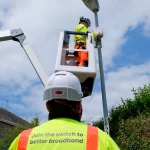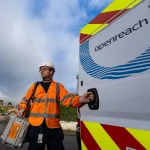Grain Name 3 New Locations for their UK FTTP Broadband Rollout

Broadband ISP and digital infrastructure builder Grain (Grain Connect) has today added three new locations to their ongoing UK rollout of a gigabit-capable Fibre-to-the-Premises (FTTP) network, which will see them building across Watford (Hertfordshire), Reading (Berkshire) and Northampton (East Midlands).
The provider, which is being supported by an investment of around £200m from Equitix and others (here), has already announced deployments across a total of 46 towns and cities, including Hull, Leicester, Liverpool, Accrington, Grimsby, Cleethorpes, Scarborough, Carlisle, Barrow-in-Furness, Hartlepool, Newport, Sunderland, Blackburn and many more.
Previously, the operator had tended to focus on only covering new build home sites (i.e. they serve over 100 new housing developments), but they’ve since expanded out to include existing properties too. Grain has also made a habit out of targeting areas where there is likely to be plenty of competition from gigabit-capable broadband rivals (Openreach, Virgin Media, CityFibre etc.), and the additions of Watford, Reading and Northampton are no exception.
Advertisement
However, the press release doesn’t state how many premises will be reached in each of the new locations or how long the individual builds will take to complete (an overall date of 2026 has been mentioned before). We’ve also had no information on how many premises they’ve been able to pass so far.
Roland Barzegar, CFO at Grain Connect, said:
“This 200m investment is a huge vote of confidence for our regional roll-out phases across the UK, and we can’t wait to bring super-fast, reliable, and affordable broadband packages to local communities.
We recently introduced our Loyalty Price Promise, where at the end of their contract, we offer customers to renew on the same monthly price we advertise to new customers on their street. Showing that once you take out a contract with Grain, you will always have access to great pricing and your loyalty won’t be exploited. This is especially important to us now, with customers being impacted by the rising cost of living.”
Customers of the service, once live, can expect to pay from just £25.99 per month for a symmetric speed 100Mbps package on a 12-month term, which goes up to just £49.99 for their top 900Mbps plan. All of these packages come with unlimited usage, free installation, a router and a pledge to ensure “no in-contract price rises.”
Mark is a professional technology writer, IT consultant and computer engineer from Dorset (England), he also founded ISPreview in 1999 and enjoys analysing the latest telecoms and broadband developments. Find me on X (Twitter), Mastodon, Facebook, BlueSky, Threads.net and Linkedin.
« Broadway Partners Give Small Update on Pembrokeshire FTTP Build
Community Fibre Launch 5Gbps Broadband for London Firms »






















































I signed as my postcode was accepted on the website however they are unable to provide an estimate as to when they will start building (just finished installing 0.9mi away)
900 up and down for £38pm.
Planning permission added today for late December
I believe there are approximately 100 Altnets in the UK, probably 97 more providers than required not including Openreach and VMO2. What happens if a price war breaks out once the rollouts are completed, under those circumstances I suspect it wont be too long before we’re down to four or five big players.
You could argue that there’s been a price war for the past 2-4 years. It never really ended, but there’s flexibility to fuel that for several more years. But come 2030, I’d still expect to be seeing around 20-30 networks, not 4-5. It will take longer for the patchwork of FTTP deployments to fully consolidate, and even then we’ll probably still have more than 4-5 players.
“But come 2030, I’d still expect to be seeing around 20-30 networks, not 4-5.”
Hard to say Mark, the history of CATV in the 80’s/90’s leaves a Deja Vu feel suggesting a different outcome. I can’t remember all the different CATV companies operating pre 2000, but they were all eventually swallowed up, or merged. I looked up some of the names on Google, I found Croydon Cable, Rediffusion Cablevision, Swindon Cable, Aberdeen Cable/Atlantic, Bell Cablemedia, Videotron, Nynex, Telewest, etc; All of them disappeared over time with the last big merger being Telewest and NTL, now VMO2, who appears to be the only remaining UK CATV provider.
It’s hard to say how long consolidation will take, or the reason various companies will disappear, but I can’t see any reason to suggest things will be different this time.
@Ex Telecom Engineer agreed, id expect 4/5 major. Some like CommunityFibre and Gigaclear to remain since they are mainly competing against Openreach.
For most operators id expect it to be:
> Get big enough to not fail, like CityFibre.
> Merge to get big enough
> Get bought by someone (I wouldn’t be suprised if someone like the Comcast owned Sky or Cityfibre went on a buying spree).
> Go bust.
@alex “big enough” is a big fallacy. If for example Talktalk buys Virgin and moves all it’s customers, suddenly Cityfibre is left without its main ISP and with a huge debt to pay
Community Fibre competes mainly against Hyperoptic and Gnetworks, not openreach.
I worked for NTL back in the day before it became the very 2000-esque rebranding ntl: and remember Barclay Knapp and the running jokes we had about his chequebook before the dot com bubble burst. From this experience alone I can’t see more than single figures of altnets in about a decades time, what I can see is more wholesale provision over the consolidated networks however.
This is the problem, while competition is good, sometimes there can be too much. I doubt we will have any more than Zzoomm and openreach here, the city is not large enough. I think Zzoomm may struggle once Openreach extends their FTTP network. A lot of people will not know any difference, some already think that Zzoomm is BT.
Zzoomm was around here again yesterday evening, around 6pm, mucking about with a loop of fibre hanging on the pole, they took the end of it up the road, so I don’t know if they will attach it to the next pole, I see that it is back on our pole in a loop again
I wonder how many of them will survive, in the long run. They’ve had to entice large venture capital to get going and they’ll have to re-coup it quick. I also hope that we see the competition watchdog put a block on altnets being bought by giant corporations like Liberty Global or BT etc.
@John – Cityfibre have multiple large customers, not just TalkTalk.
@Anonymous – I can’t see there being much of a business case for someone like BT buying a smaller alt net. They are more than capable of building themselves. Buying the competition is very expensive – either an overinflated price or having to re-build to the Openreach standard.
This market will definitely go the same way as well it did all those years ago and as it did years ago all these up and coming businesses will be bought out by the biggest companies or there competitors what goes around comes around.